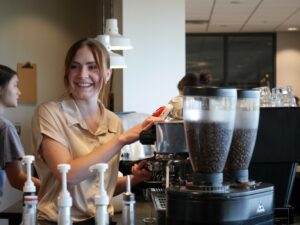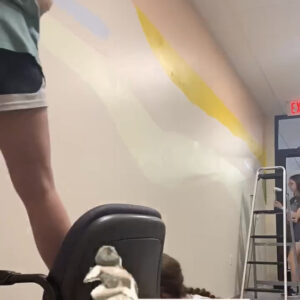Photo by: Abby Bellow
With one week remaining until graduation, many seniors wonder if they are realistically prepared for adulthood, and more specifically, the demands of the workforce.
Companies are finding that many graduates lack fundamental “soft skills,” including interpersonal communication, punctuality, motivation, flexibility and attention to appearance.
Mark Chan, director of career services at Oklahoma Christian University, emphasized these skills as a vital factor in helping companies select an appropriate candidate.
“Those with strong communication and interpersonal skills always tend to navigate the job search process better,” Chan said. “And employers usually pick them up quicker because they see them as interpersonally proficient, which makes them a better fit with their team. Most employers can train for technical skills, but it is much more difficult to train for soft skills.”
Lack of skills is not the only factor that makes students unprepared for the workforce; many are unprepared for the job search as well. In his experiences with students looking for a post-graduation job, Chan noted several elements that contribute to a lack of preparation for graduation.
“Everybody finds a job eventually,” Chan said. “It definitely takes some new grads, however, longer to land their jobs than others. In my estimation, this is primarily due to two things: procrastination and not understanding that the job search process can be arduous and time consuming.”
Chan recognized that seniors are initially concerned with finishing their academic year, but that many are just now realizing that they need to find a job as well.
“So now it is the 11th hour of your senior year and you don’t have a job and you are graduating in several weeks,” Chan said. “What do you do? You rush to put a resume, cover letter, references and writing samples or a portfolio together, and because you are rushing around, you don’t give those things the time and effort they demand. This is a common problem. Are students capable of producing solid career documents? Of course they are. They just have to give themselves enough time to do it right.”
David Sellers, a senior marketing management major, said he feels “moderately prepared,” and noted that his sense of independence proved the most helpful in getting him to this point.
“I would emphasize to people that there are some really good resources out there, but you have to look for them yourself,” Sellers said. “The school isn’t just going to hand them to you. Through the [American Marketing Association] and other professional organizations, I’ve learned a ton. Just relying on your classes to help you figure everything out is maybe going to give you a bare minimum, but getting more involved and taking charge of things on your own is going to be a lot more effective in the long run.”
An article on Inside Higher Ed titled “Preparedness Paradoxes,” claims that colleges should be more involved in the career process for their students with hands-on learning and consistent career advisement.
Sellers noted that Oklahoma Christian played an important role in his level of preparation, primarily due to his involvement with the American Marketing Association (AMA).
“I feel somewhat prepared, and I think that OC has been responsible for a lot of that,” Sellers said.
Edwin Goodwin, a senior youth and family ministry major, noted that some preparation does not necessarily come from being in the classroom.
“It’s hard to prepare a student to go into the workforce, because there’s never a similar experience for everyone,” Goodwin said. “What a professor might have experienced is not the same as what a student is going to experience. Even though when professors share their ministry experience it’s very helpful, it’s still scary because you don’t know what you personally are going to face.”
Senior Shelly Welch attributed her own level of readiness for graduation to experiences outside of the classroom.
“I think that my experience with jobs and internships in an office setting has helped prepare me,” Welch said. “I more see the classroom as the theoretical side of things, and jobs and internships as the application of it. People who go straight from the classroom into the workforce without ever doing an internship usually struggle the most.”
In addition to feeling unprepared for the work force, some students are also unsure of their ability to navigate the fundamentals of adult life.
“I’m not feeling that prepared at all,” Goodwin said. “All I’ve known the last 18 years is school, and getting into a new world is scary. I know I’ll be OK, but it’s hard to be ready for something that isn’t here yet, something I haven’t experienced before.”
Nevertheless, many of these graduates consider life a learning process and are less concerned about knowing everything prior to their walk across the stage.
“It wouldn’t make sense to be fully prepared: life is a [continual] learning experience,” Goodwin said. “If I know everything about life by the time I’m 22, I’ll be bored forever because I’ll have nothing else to learn.”
Sellers echoed Goodwin while showing confidence in his ability to handle the post-college world.
“I think that in some ways it’s been a period of transition for the last four years, but obviously the transition isn’t complete yet,” Sellers said. “However, I think I have the skills to figure out [how to be an adult] . . . on my own.”
Goodwin had a final piece of encouragement for fellow students as they strive toward their own degrees.
“Do as much as you can outside of the campus and your classroom, involving what you desire to do for the rest of your life,” Goodwin said. “You can have straight As, a 4.0 and honors, but the experience is what matters at the end. It’s what marks what great people can accomplish.















Be First to Comment